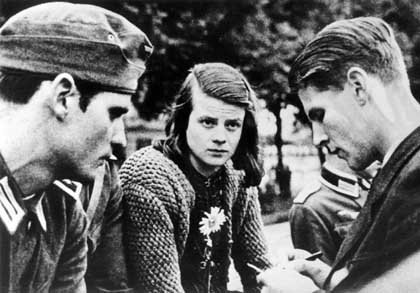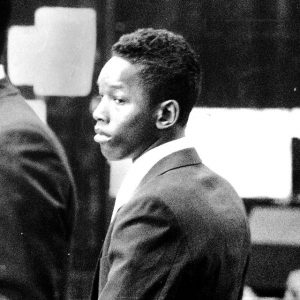Have you ever thought, why didn’t anyone try to stop Adolf Hitler? Were any Germans ever against him? Was the German community aware of the harm that Hitler was causing to innocent people? Indeed, there were. But who were the people behind these courageous acts? A group of college student attempted to stop Hitler and his heinous acts against Jews and his betrayal of the German people. In 1942, the group known as the White Rose arose in the streets of Munich, Germany. It was a student resistance movement that was created to expose Hitler to all of Germany. Their acts were believed to portray the true meaning of Christianity. The group made leaflets that contained information about the Nazis and their injustices. The letters were mailed to random addresses all over Germany. These students were willing to do whatever was needed in order to follow their moral duty and stop Hitler and his army.1
Sophie Scholl will always be remembered as one of the key individuals in the White Rose movement. She was born in Forchtenberg, Germany in 1921. She grew up in a religious and very political home. Her father was the mayor of the small town and her mother was a deaconess at their local church.2 Her parents raised her family to live an anti-Nazi life. Sophie was the second of three children. Both Hans and Sophie, like most other young Germans, were a part of the Hitler youth movement. There, individuals would be taught Nazi morals and train for battle. While in the program, Sophie and Hans were exposed to the injustices that were done by the Nazi government.3 Hans, her older brother, and his friends were responsible for starting the resistance movement. They named it after a white rose because it portrayed “purity and innocence.”4

Hans was attending the University of Munich when he started the movement. Along with friends that were also opposed to Hitler and the Nazi regime, they began writing leaflets that denounced the inhumanity of Hitler and his army. They described the Nazis as gangsters and violent criminals.5 After Sophie graduated High School, she followed her brother’s footsteps and attended the University of Munich, where she studied biology and philosophy.6
Sophie was an excellent writer, which played a crucial role in not only writing leaflets but distributing them as well. Not only did the group write leaflets, they spread their beliefs by spraying quotes on twenty-nine different public buildings. Some of the sayings were, “Down with Hitler” and the word “Freedom” on the sides of the entrance of the University of Munich.7 On one very significant leaflet, they exposed the horrendous acts, in which Hitler was responsible for the mass-murder of Jewish people. The group described this as, “the most terrible crime against human dignity, a crime not to be compared to any similar one in the history of mankind.” 8

One night, Sophie had a dream that she and her brother were arrested by the Gestapo. Little did she know that her dream would one day become a reality.
“Our people stand ready to rebel against the national socialist enslavement of Europe in a fervent breakthrough of freedom and honor.” This was the last line of the last leaflet that Hans and his sister would distribute on February 18, 1943.9 While everyone was in class, Hans and Sophie distributed the leaflets around the University. When they were done, Sophie went back and threw a stack of leaflets down a balcony. She was not able to flee the scene fast enough, as a Janitor saw her throw the leaflets down a balcony and went after her and the man beside her, Hans. The janitor stopped the individuals and reported the incident. Later, they were detained and taken to Gestapo Headquarters, where they were questioned. At the time, Hans still had a hand-written letter in his pocket, which incriminated his friend, Christoph Probst. The letter was potentially going to be the group’s next leaflet. Christoph was brought in for questioning. The individuals were detained for four days. They were questioned, and they in turn became victims of the brutality of the Nazi machine. While detained, the Gestapo broke one of Sophie’s legs. The three individuals were found guilty of “high treason,” and four days later were beheaded. The Gestapo did not stop, and they were on the lookout for other people who were involved in the group. It was not until five months after their execution when more members were detained and punished. One of the individuals was a Professor who had helped the group write some of the leaflets; he was later executed as well.10
The members of the White Rose stood up for their beliefs and condemned the horror of the Nazis, including Sophie, who was willing to do whatever was needed to inform others and stop Hitler from committing injustices, even if it meant losing her life in the process of it. They exposed the Nazis to all of Germany and fought to stop Hitler. Sophie Scholl along with her friends will go down in history for their braveness and courage to stop the Nazi regime.
- Annette Dumbach and Jud Newborn, Sophie Scholl and the White Rose (Oxford: Oneworld Publications), 5. ↵
- Women in World History: A Biographical Encyclopedia, 2002, s.v. “Sophie Scholl,” by Anne Commire. ↵
- John M. Lewis, “Germany and the White Rose,” New Hampshire Bar Journal 53, No. 2 (2012): 56-57. ↵
- Russel Freedman, We Will Not Be Silent: The White Rose Student Movement That Defied Adolf Hitler (New York: Clarion Books, 7 ↵
- John M. Lewis, “Germany and the White Rose,” New Hampshire Bar Journal 53, No. 2 (2012): 56-57. ↵
- Russel Freedman, We Will Not Be Silent: The White Rose Student Movement That Defied Adolf Hitler (New York: Clarion Books, 24. ↵
- Simon Henderson, “The White Rose and the definition of ‘resistance: Simon Henderson explains the significance of Hans and Sophie Scholl in the history of Nazi Germany,” History Review No. 53 (2005): 42. ↵
- Simon Henderson, “The White Rose and the definition of ‘resistance: Simon Henderson explains the significance of Hans and Sophie Scholl in the history of Nazi Germany,” History Review No. 53 (2005): 42. ↵
- Simon Henderson, “The White Rose and the definition of ‘resistance: Simon Henderson explains the significance of Hans and Sophie Scholl in the history of Nazi Germany,” History Review No. 53 (2005): 42. ↵
- Simon Henderson, “The White Rose and the definition of ‘resistance: Simon Henderson explains the significance of Hans and Sophie Scholl in the history of Nazi Germany,” History Review No. 53 (2005): 42. ↵



67 comments
Vanessa Tombo
This was a very interesting and highly educational article. In all my years of schooling and learning the ins and outs of the holocaust never did I read about “the White Rose”. Nor the role they played in the stopping Hitler. They were willing to pay an ultimate price for educating the German societies about the atrocities that were happening on German soil.
Hannah Wilson
World War II is my favorite subject, but it is also heartbreaking that someone could have that much control and power to have others enforce such horrors to/on other human beings. Hitler and his Nazis had no humanity and some many innocent lives were taken. Sophie and her resistance group were some of those lives. I have never heard of this story before, or that anyone in Germany openly resisted Hitler. These students had an unbelievable amount of courage to be able to do that. Great article.
Thomas Fraire
I have never heard of these resistance movements during world war two coming into this article. It is refreshing to see the efforts put forth by many to stop Hitler, it is still tragic though that so many died. It is really cool how they made sure they spread the word of what Hitler was doing. It is very admirable that the leaders died for something they believed in.
Anna Guaderrama
Honestly speaking, I have never once in my life heard anything about anyone resisting or a resistance movement for the matter of fact that dealt with Nazi’s. It was interesting and insightful to read about such a courageous movement started by a young girl. Even knowing her possible outcomes of arrest and even death, she still took the chance and founded the White Rose Resistance Movement. I think it’s inspiration to read about what they accomplished and that they felt so strongly about going through with their thoughts and not just complaining or thinking about it.
Kimberly Simmons
Great article! I never would have known that such a group existed had I not read this. It’s refreshing to know that there were good people trying to stop Hitler’s heinous act – especially because they were students. I’m glad you made Scholl the star of the story because it’s important to recognize the courageous acts of women and their voice in the world. Clearly, she was a strong individual that held high morals and fought for what she believed in.
Noah Laing
I was never aware that there was a group of young college students that displayed so much courage and bravery to stand up to the immense power of Hitler. The White Rose Resistance members were well aware that their actions could result in death, however they still felt strongly enough in their beliefs to overlook that fact. I find it surprising that I’ve never seen the story in this article implemented into any Hitler movies I’ve seen or books I’ve read, very informative article.
Fumei P.
I’ve never heard any stories about an active resistance against the Nazi regime until now. Sophie Scholl and the actions of the White Rose student resistance was a display of great courage. They knew the risks associated with the distribution of anti-Nazi propoganda but they stood up for their beliefs and shared them with the anyone who would listen.They sacrificed their lives to spread the truth about Hilters’ cruelty. Its a shame that the founders lives ended so brutally at the hands of the Gestapo.
Michael Thomas
This article was interesting and informative. I did not know there was a resistance movement that stood against Nazi regime. Sophie and the White Rose resistance movement had courage to stand up to a cruel regime. I feel that history courses that cover WWII should include this resistance movement because of their sacrifice to stand up against the Nazi’s injustice.
Angelica Padilla
This is the first time i’ve heard of this group, and it is crazy to hear. It is encouraging for younger college students now to read this article and not feel ashamed to go against what you think is wrong or right. I believe this is the first time I’ve read an article that involved people who stood up to Hitler, and it is inspiring. It always is inspiring knowing that people are willing to lose their life to expose or to protect for something they believe is morally wrong.
Hanadi Sonouper
This was one of the most interesting articles I have read thus far. It is interesting because for as long as I’ve heard stories about Adolf Hitler, I have never heard one quite like this. It tells a story that no matter what age you are, you can always stand up for what you believe in. These brave high school students who saw human genocide as a crime against humanity wanted to see a change, and with courage and determination they were able to spread the word to as many people as possible across Germany to exploit Hitler’s terrible demeanor. Young Sophie and Hans used their platform of education to get the word out as fast as possible, even though they were unheard off their story carries on today to hopefully inspire to have a voice when one is silenced. The author used very good syntax and diction to explain every aspect of the reading in a clear and precise way.